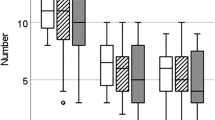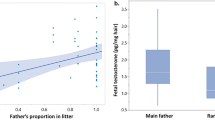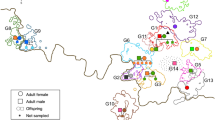Abstract
STUDIES of human populations have shown that inbreeding results in an increase in the number of offspring with greatly reduced viability. It seems likely that there are similar effects in other primates. In Papio anubis it seems that this problem is reduced by the transfer of males between groups. In a population studied at Combe National Park in western Tanzania inbreeding may be essentially avoided through the transfer of all males out of their natal troop.
This is a preview of subscription content, access via your institution
Access options
Subscribe to this journal
Receive 51 print issues and online access
$199.00 per year
only $3.90 per issue
Buy this article
- Purchase on Springer Link
- Instant access to full article PDF
Prices may be subject to local taxes which are calculated during checkout
Similar content being viewed by others
Author information
Authors and Affiliations
Rights and permissions
About this article
Cite this article
PACKER, C. Male transfer in olive baboons. Nature 255, 219–220 (1975). https://doi.org/10.1038/255219a0
Received:
Accepted:
Issue Date:
DOI: https://doi.org/10.1038/255219a0
This article is cited by
-
Sexual swellings advertise female quality in wild baboons
Nature (2001)
-
Reproductive constraints on aggressive competition in female baboons
Nature (1995)
-
Life-history characteristics of a wild population of vervets (Cercopithecus aethiops sabaeus) in Barbados, West Indies
International Journal of Primatology (1986)
-
Spatial structure of chacma baboon groups
International Journal of Primatology (1984)
-
Diachronic changes in two eastern lowland gorilla groups (Gorilla gorilla graueri) in the Mt. Kahuzi Region, Zaïre
Primates (1983)
Comments
By submitting a comment you agree to abide by our Terms and Community Guidelines. If you find something abusive or that does not comply with our terms or guidelines please flag it as inappropriate.



